Overview
WHO WE ARE
Launched in 2025, the CDB Climate Change Project Preparation Fund (CC PPF) helps the Bank's Borrowing Member Countries (BMCs) identify, design and prepare high-impact programmes and projects which address their climate change adaptation and mitigation needs.
WHAT WE DO
BMCs can access resources/support from the CC PPF to implement a wide range of project preparation activities for the following four types of climate action programmes/projects:
- Type 1: Capital projects/programmes to be financed by CDB that focus on addressing the underlying drivers of CC and/or the underlying causes of CC vulnerability, including at the system level. These projects/programmes would make a direct and significant contribution to the climate change adaptation and mitigation priorities of CDB’s client countries.
- Type 2: Climate-related capital projects/programmes seeking funding from international concessional climate funds. The CC PPF will help develop proposals that aim to access project preparation funding from other non-CDB sources but require early-stage support from CDB (i.e. before being able to access project preparation support from entities such as the Green Climate Fund and Adaptation Fund). For this type of support, CDB would lead the projects as the Accredited Entity and/or participate as a co-financier.
- Type 3: Capital projects/programmes to be financed by CDB that focus on addressing broader sustainable development needs and integrate measures to manage and/or reduce physical climate risks. These projects may not focus on responding to countries’ climate change adaptation and/or mitigation needs but have significant potential to enhance resilience if/when the core project design work is informed by a Climate Risk and Vulnerability Assessment (CRVA).
- Type 4: Resilience-focused technical assistance projects. These projects aim to strengthen the capacity of BMCs related to disaster risk management and climate change adaptation.
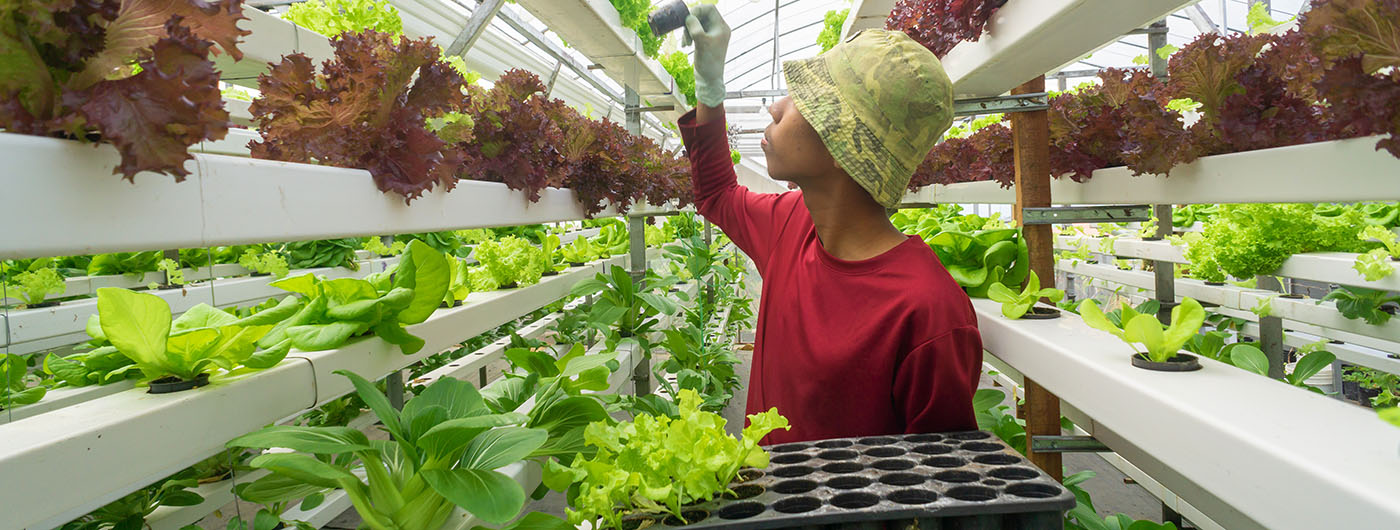
Information for Proponents and Contributors
For Potential Proponents
Interested BMCs are invited to connect with CDB to explore project ideas, assess eligibility and begin applications. See brochure below for details.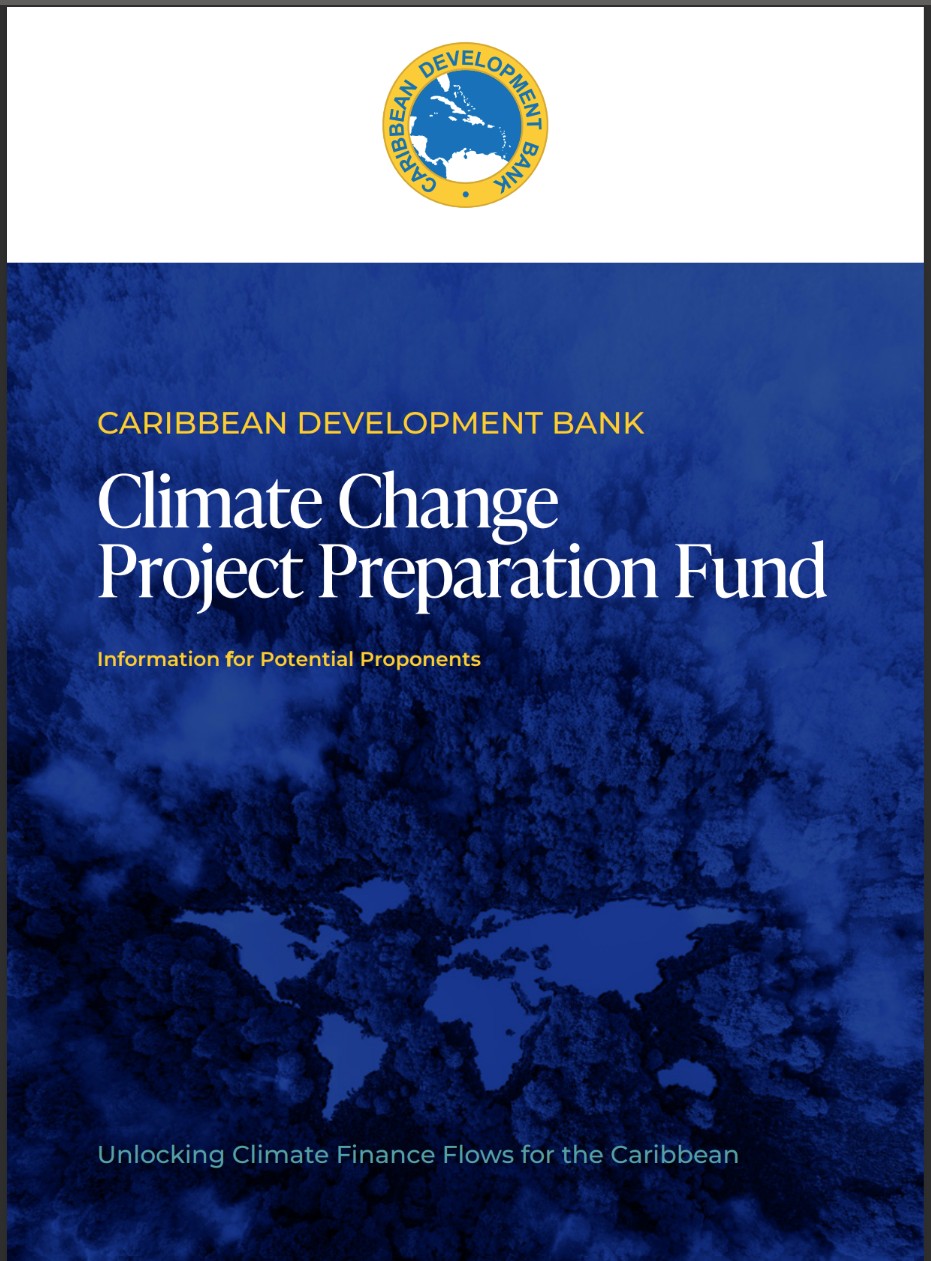
For Potential Contributors
Interested financial contributors are invited to discuss opportunities to contribute to the Fund to scale up regional climate action. See brochure below for details.
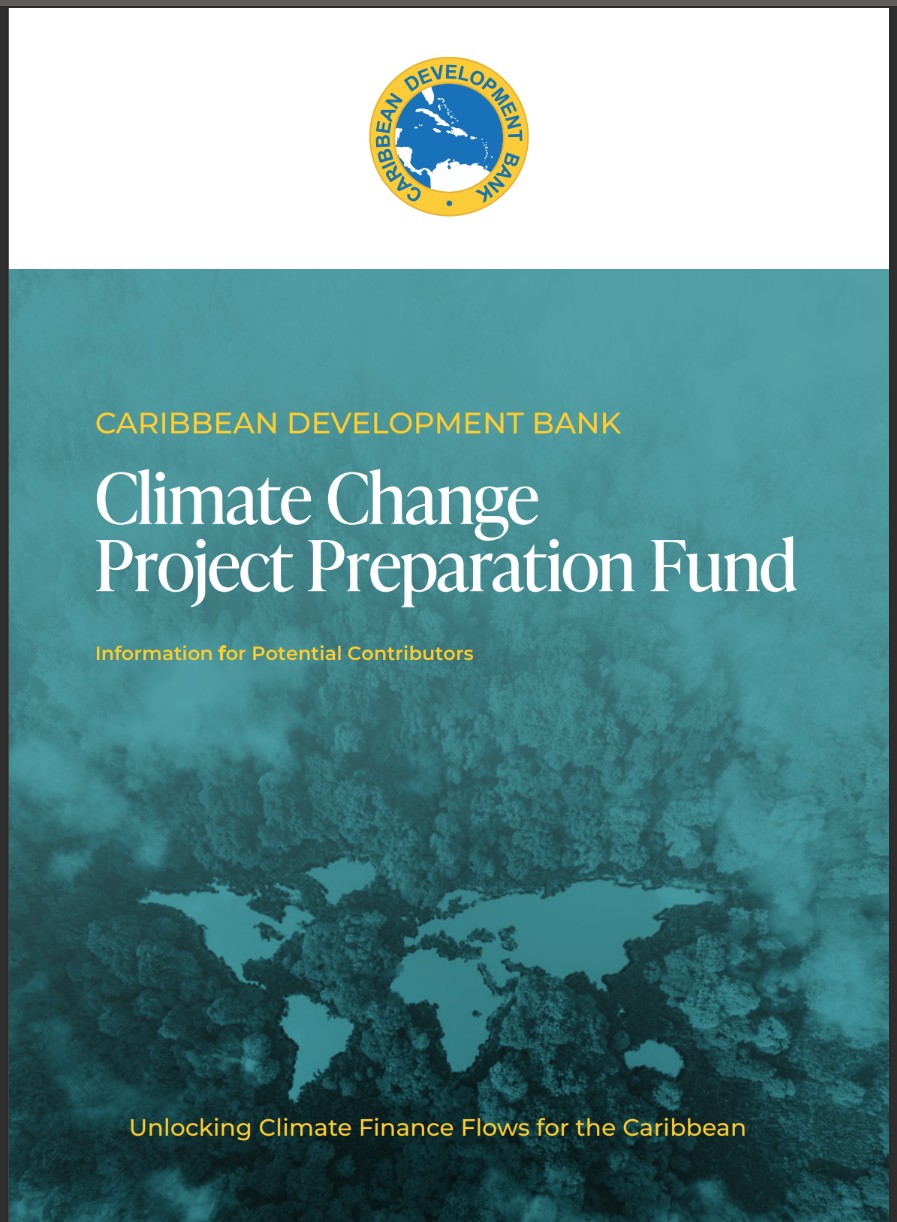
Frequently Asked Questions (FAQs)
The Climate Change Project Preparation Fund (“CC PPF”) is a fund managed by the Caribbean Development Bank (CDB) that aims to address critical bottlenecks faced by CDB Borrowing Member Countries (BMCs) in identifying, designing and preparing projects that contribute to their climate change goals and targets.
As Small Island Developing States (SIDS), CDB’s BMCs are highly vulnerable to climate and disaster risks, requiring significant adaptation and energy transition investments. However, fiscal and debt sustainability challenges limit the response capacity of Caribbean countries, calling for new approaches to close the Caribbean climate finance gap.
Difficulties in identifying and preparing climate action projects are among the key barriers inhibiting climate finance flows. Many BMCs lack the resources to develop strong project proposals, and require additional technical expertise and support with data analysis and risk assessments. Additionally, many BMCs are finding it difficult to access existing project preparation funds due to lengthy applications, excessive data requirements, and stiff competition. Most of these funds are not tailored to SIDS' unique needs.
Due to CDB’s standing, experience and reputation in the region, the Bank is uniquely positioned to address the specific needs of its BMCs. The Bank’s exclusive focus on the Caribbean and strong local networks make it uniquely positioned to manage the CC PPF. Its deep understanding of the challenges faced by BMCs allows it to tailor support to their specific needs, particularly for smaller projects that may not attract larger financiers. Additionally, CDB’s close relationships with regional policymakers, administrators, and stakeholders enable it to provide hands-on, context-specific support.
The CC PPF supports CDB’s client countries to: (i) prepare high-quality and bankable climate action projects; (ii) facilitate access to international concessional climate funds; (iii) mainstream climate resilience into capital projects; and (iv) improve access to CDB technical assistance for climate and disaster resilience.
Furthermore, the CC PPF seeks to maximise its value to client countries by: (i) implementing streamlined application and review processes; (ii) ensuring CDB staff are available to co-develop applications with national counterparts; and (iii) supporting the procurement and supervision of consultants.
The CC PPF provides support to public sector entities, state-owned enterprises, utility companies that provide public services, and other non-profit entities in BMCs. These entities can apply for support to develop eligible types of projects (see question 3.3).
Projects that could be supported by the CC PPF may be identified by CDB client countries, CDB staff or development partners based on national climate priorities and funding needs. Project ideas may emanate from the development of the Country Engagement Strategy with CDB or from other national development strategies and plans. All project preparation support requests require official government endorsement.
Projects that request support must align with at least one of the eligible themes, qualify as an eligible project type (see question 3.3) and the intended project preparation activities must fall within the eligible activities (see question 3.4). Eligible themes include resilient infrastructure, integrated urban development, climate-resilient communities, sustainable natural resource management, agriculture, renewable energy, energy efficiency, and low-emissions transportation. In addition, the Implementing/Executing Agency must meet the requirements of eligible entities under the CC PPF
To be eligible for support from the CC PPF, a project must fall into one of the following four categories:
Type 1: Capital projects/programmes to be financed1 by CDB that focus on addressing the underlying drivers of CC and/or the underlying causes of CC vulnerability, including at the system level. These projects/programmes would make a direct and significant contribution to the climate change adaptation and mitigation priorities of CDB’s client countries.
Type 2: Climate-related capital projects/programmes seeking funding from international concessional climate funds. The CC PPF will help develop proposals that aim to access project preparation funding from other non-CDB sources but require early-stage support from CDB (i.e. before being able to access project preparation support from entities such as the Green Climate Fund and Adaptation Fund). For this type of support, CDB would lead the projects as the Accredited Entity and/or participate as a co-financier.
Type 3: Capital projects/programmes to be financed by CDB that focus on addressing broader sustainable development needs and integrate measures to manage and/or reduce physical climate risks. These projects may not focus on responding to countries’ climate change adaptation and/or mitigation needs, but have significant potential to enhance resilience if/when the core project design work is informed by a Climate Risk and Vulnerability Assessment (CRVA).
Type 4: Resilience-focused technical assistance projects. These projects aim to strengthen the capacity of BMCs related to disaster risk management and climate change adaptation.
The following table provides an overview of the types of activities that are eligible for each type of eligible project. 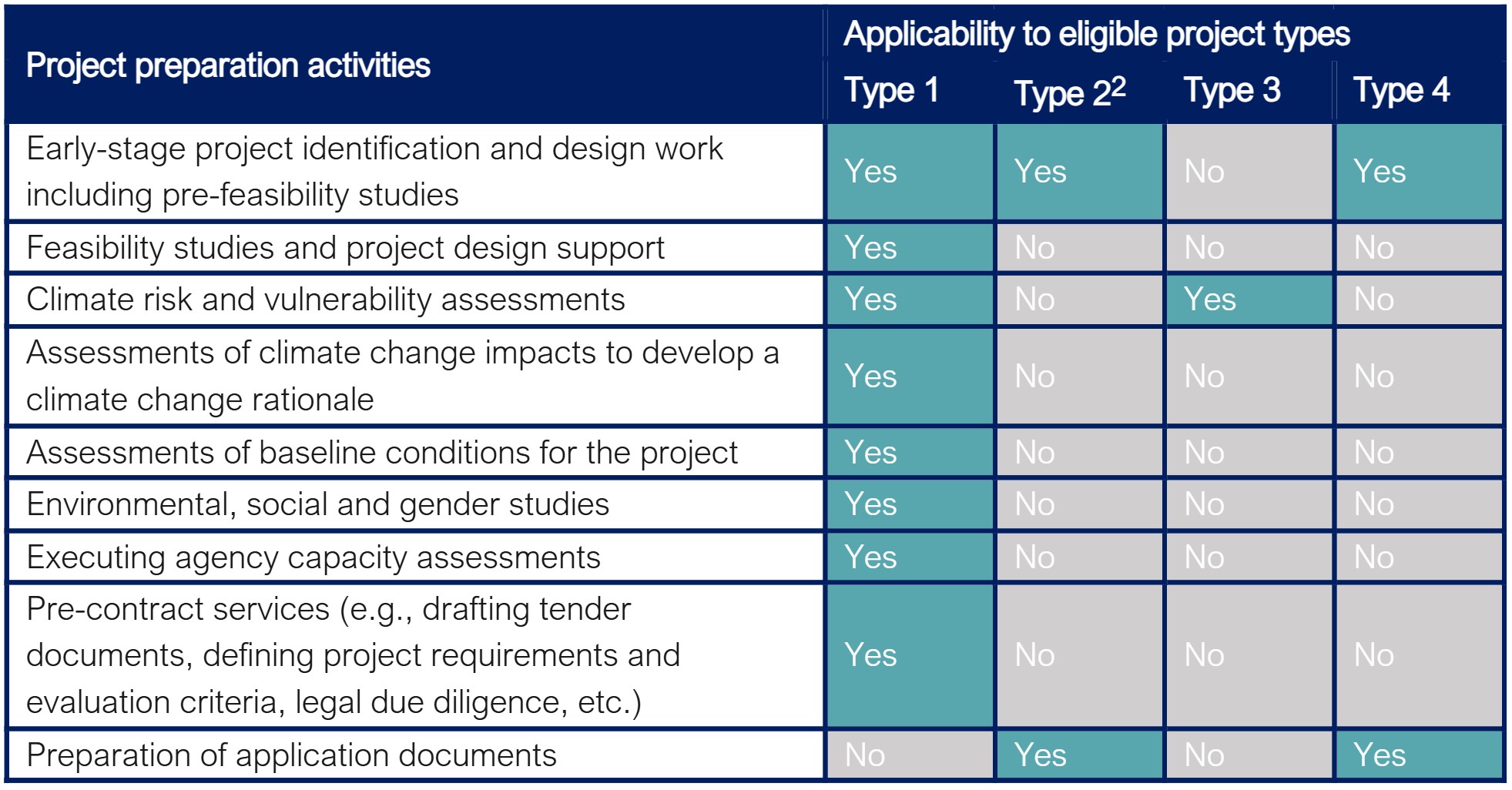
In the initial capitalisation phase (2025–2028), the CC PPF is expected to provide approximately USD 3–5 million in proposal development support.3 Funding availability per project type will vary based on the required project preparation activities, with no predefined funding limits per project.
The CC PPF provides project preparation support to BMCs exclusively through grants. However, the following two reimbursement conditions will be included in grant agreements for Type 1, 2, and 3 projects:
-
Reimbursement Based on CDB’s Right of First Refusal: If a project that was prepared using support from the CC PPF secures funding from another organization without CDB’s involvement, the full grant amount must be repaid—unless CDB was first given the opportunity to co-finance or fully finance the project.
-
Reimbursement Upon Financial Close: If a project that received CC PPF support secures loan financing from CDB, 50% of the grant provided for project preparation must be repaid upon the first disbursement of the loan. This condition applies to Group 1 and 2 countries, while Group 3 is exempt.
No reimbursement conditions apply to CC PPF support for Type 4 projects.
Support from the CC PPF does not require counterpart funding. The standard counterpart contribution requirement of at least 15%, as per CDB operational policies, will be waived for all support that is provided through the CC PPF.
The CC PPF project cycle includes several key steps. Relevant CDB staff are available to guide and support national counterparts throughout this process. The following figure provides an overview of the main steps and indicative timelines.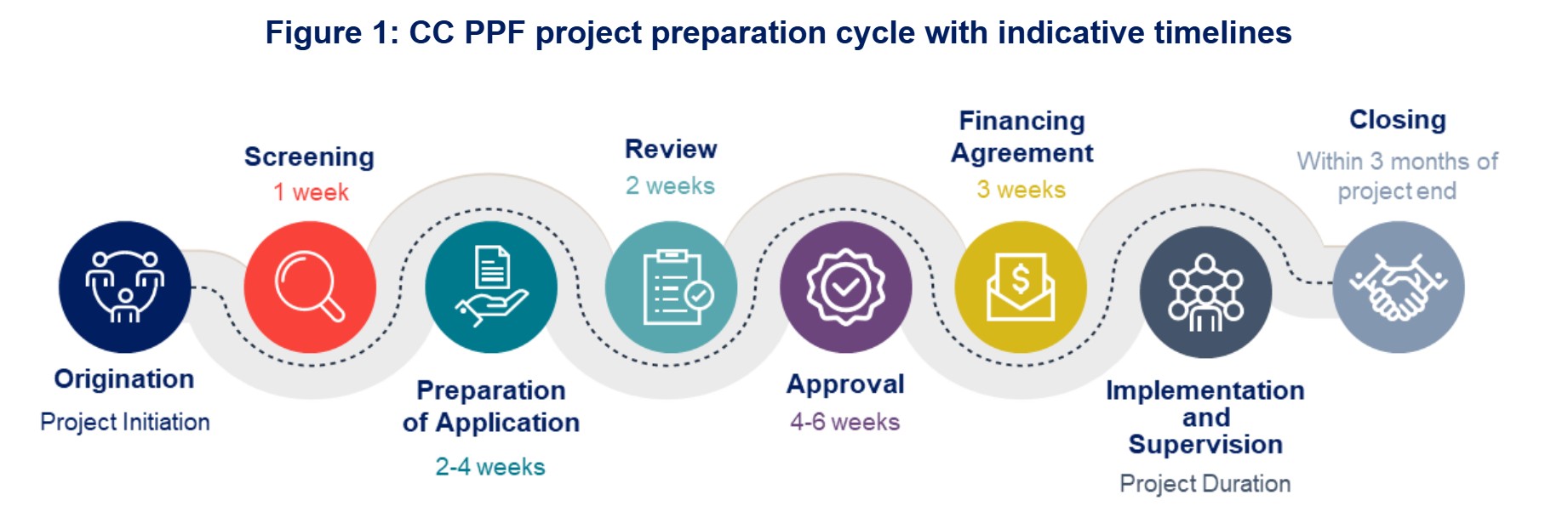
Once a suitable project has been identified, CDB technical staff will work with project proponents to complete an eligibility self-assessment and submit it to the CDB CC PPF Fund Manager for initial review. This eligibility screening helps ensure projects meet the CC PPF eligibility criteria and are aligned with its strategic priorities as early as possible. If/when the Fund Manager confirms that the project is eligible, CDB technical staff, with input from the project proponent, prepares a formal application outlining the project’s objectives, scope, and required preparation activities (see question 5.3 for more information).
All CC PPF project preparation support requires official government endorsement. Therefore, applicants must submit a Letter of Government Assurance alongside the application. A template and further guidance on the letter's content are available upon request.
To apply for support from the CC PPF, project proponents must work with CDB technical staff to complete a Screening Checklist (to confirm eligibility to the Fund), and a Technical Assistance (TA) Paper along with a Government Assurance Letter (to formally apply for Fund support once eligibility in confirmed).
The TA paper must include information about the underlying project, such as the executing agency, project size, alignment with national and sector priorities, expected outcomes, and any relevant environmental or social risks. It must also include the specific project preparation support needed, including details of required activities, estimated preparation costs, the amount of funding requested, and an implementation timeline. The level of detail required may vary depending on the project's scope and complexity.
For single-country projects, a national executing agency will be responsible for executing the project preparation support, including procurement of consultants and contract management.5 To support timely execution, CDB is also offering two additional types of assistance:
Executing agencies may request support from a procurement agent to assist with the procurement and/or supervision of project preparation consultants.
Executing agencies may procure consultants via call-down contracts under framework agreements between CDB and rosters of qualified consultants (both procurement agents and project preparation consultants).
For regional programmes with a strong justification for regional management, CDB may assume responsibility for execution (including procurement and contract management).
An application submitted to the CC PPF should clearly demonstrate the following:
- Alignment with the eligibility criteria (i.e. eligible themes, projects, activities, etc.).
- Clearly defined and costed project preparation activities that are linked to concrete results and deliverables, and that (once fully implemented) would culminate in a completed project proposal.
- A strong technical and financial justification for the support being requested (i.e. why the project cannot proceed without assistance from the CC PPF ).
- A well-structured and feasible implementation plan for the project preparation activities.
- The project/programme to be developed is clearly defined, technically and financially sound, and can make a meaningful contribution to addressing climate change adaptation and/or mitigation needs (see question 6.2 for more information).
- Strong government support for both the project preparation request and the underlying project/programme proposal to be developed.
The more developed a project idea is, the easier it is for CDB staff to assess its alignment with, and potential contributions to the objectives of the CC PPF. A strong project proposal therefore includes the following key elements:
- Project Objectives: Clearly define the goals the project aims to achieve.
- Climate Rationale: Justify the project’s relevance by explaining the climate-related challenges it seeks to address.
- Project Context: Describe how the project aligns with national climate strategies, sector priorities, local needs, and regional development objectives.
- Project Logic: Establish clear linkages between expected project impacts and planned activities. A draft Theory of Change is not required but can be very helpful in this regard.
- Project Description: Provide details on the envisioned project components and activities, structured within a logical framework.
- Expected Results and Benefits: Identify the themes the project addresses (e.g., mitigation, adaptation) and outline its expected climate adaptation and/or mitigation impacts, along with potential economic and social co-benefits.
- Budget Information: Include information about the estimated project budget and expected financial structure, including any potential sources of co-financing.
At the outset of the application process, the respective CDB Project Coordinator and Fund Manager of the CC PPF conduct an initial simplified screening of project preparation support requests (see Figure 1). This screening process ensures that only eligible projects that align with the CC PPF’s objectives are developed into full applications.
The screening process is guided by a screening checklist, which is used at the ‘Screening stage’ to assess whether projects meet the initial eligibility criteria. This checklist is available upon request and can assist project proponents in conducting a self-assessment before submission.
Once a project passes the screening stage, the project proponent will work with relevant CDB staff to develop the full application, which is then subject to a Full Application Review conducted using a standardized review form. This form ensures that project applications are evaluated consistently against key considerations, which include:
- Alignment with regional and national development priorities, as well as CDB strategic goals.
- A clear technical and financial rationale for requesting CC PPF support.
- Well-defined project preparation activities with concrete deliverables.
- A feasible financing plan for the capital project, including potential co-financing opportunities.
For detailed guidance on structuring a strong CC PPF application and understanding the key elements of a successful project proposal, project proponents should refer to Section 6, which outlines best practices and assessment criteria in greater detail.
Applicants should be aware of the following key considerations when preparing a request for CC PPF support:
- Partial Reimbursement of Grants: The grants provided under the CC PPF are (at least partially) reimbursable. Applicants should carefully review the reimbursement conditions, particularly for Type 1, 2, and 3 projects, which may require repayment under specific circumstances.
- Readiness for Approval: The CC PPF aims to support the preparation of projects that will be ready for approval upon completion of the CC PPF support—with the exception of Type 2 projects. In other words, projects should have a direct and tangible link between the upstream support provided by the CC PPF and downstream climate finance approvals. Applicants should ensure that their project preparation activities are designed to culminate in a fully developed, fundable proposal.
- Government Assurance and Alignment: Strong government backing is essential for successful applications. All requests must be accompanied by a Letter of Government Assurance, ensuring that the project aligns with national climate priorities and has a feasible implementation pathway.
- Eligibility of Applicants: Private sector entities are currently not eligible to apply for or receive CC PPF support. The fund is dedicated to supporting public sector entities, state-owned enterprises, utility companies that provide public services, and other non-profit entities in CDB’s Borrowing Member Countries (BMCs).
Applicants are encouraged to engage with CDB early in the process to ensure alignment with CC PPF priorities and eligibility criteria. Additional guidance is available upon request.
Contact
The CC PPF is managed by the CDB’s Environmental Sustainability Division (ESD). For more information, please contact: CC-PPF@caribank.org.